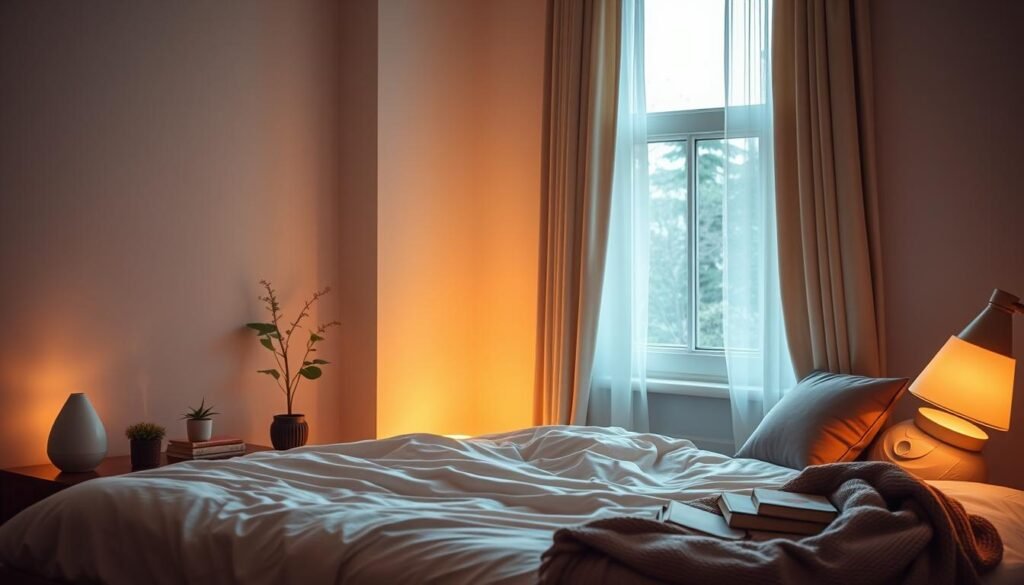Did you know nearly one in three U.S. adults occasionally suffer from insomnia? This sleep disorder doesn’t just affect one’s well-being. It also raises risks for heart disease, obesity, and dementia. It’s crucial to pinpoint factors that cause insomnia and find effective remedies. Thankfully, exploring natural sleep techniques offers hope. These methods help individuals beat insomnia and enjoy restful nights again.
Key Takeaways
- Recognizing that the average adult requires seven to eight hours of sleep can guide effective sleep strategies.
- Exploring natural sleep remedies may enhance the chances of restful nights.
- Understanding how stress impacts sleep quality is vital in managing insomnia.
- Establishing a consistent sleep schedule can help regulate your circadian rhythm.
- Engaging in regular physical activity can promote better sleep quality.
- Identifying caffeine and alcohol consumption patterns can aid in overcoming insomnia.
- Utilizing cognitive behavioral techniques may provide significant relief from persistent sleep disturbances.
Understanding Insomnia and Its Impact on Health
Insomnia makes it hard to fall or stay asleep. About 60% of Americans struggle with it, especially during stressful events like the pandemic. This issue can mess up someone’s day and change how they live.
A third of adults will face short-term insomnia at some point. Meanwhile, one in ten will deal with chronic insomnia. This means they have trouble sleeping for months. Insomnia is serious. It can lead to mental health problems, increase the risk of accidents, and even substance abuse.
Right now, between 25 to 30 million Americans are dealing with insomnia. It could be short-term or long-term. People are now looking into non-drug ways to get better sleep, such as cognitive behavioral therapy (CBTi). Studies show CBTi helps 70-80% of people with long-term insomnia.
Although many use medication to sleep, there are other ways. Things like herbs and mental health care can help, too. It’s important to tackle both sleep and mental health together for the best care.
More information on insomnia disorders and their impact on health can be found here.
The Definition and Types of Insomnia
Insomnia has different forms and reasons behind it. There are mainly two types: acute and chronic insomnia. Acute insomnia is short-term, lasting less than three months. It happens at least three nights a week. Stress, new environments, or having too much caffeine and alcohol can trigger it. This insomnia type usually gets better once you deal with these triggers.
Chronic insomnia lasts for three months or more. It happens at least three times a week. It comes from ongoing stress or health and mind issues. This long-term sleep problem can disturb your day and how you think. Knowing the types of insomnia helps in finding the right treatment.
Within these main types, there are more specific kinds. Some people have primary insomnia, which means there’s no clear cause. Others suffer from secondary insomnia, which is due to other health problems. Onset insomnia makes falling asleep hard, often for younger people stressed out. Maintenance insomnia means waking up a lot at night, a common issue for older folks.
One special kind is psychophysiological insomnia, where worry about sleep makes sleeping harder. Since insomnia can come from many situations, figuring out the exact type can help treat it. This way, life can get better.
| Type of Insomnia | Duration | Common Triggers | Characteristics |
|---|---|---|---|
| Acute Insomnia | Less than 3 months | Stress, trauma, substance use | Occurs 3+ times a week; often resolves quickly |
| Chronic Insomnia | 3 months or longer | Unresolved stress, medical issues | Persistent sleep disturbances; affects daily functioning |
| Onset Insomnia | Variable | Psychological issues | Difficult to fall asleep; more common in younger individuals |
| Maintenance Insomnia | Variable | Age-related changes | Difficult to stay asleep; more common in older adults |
Common Causes of Insomnia
Many people struggle with insomnia due to various reasons. Stress and anxiety are big factors, making it hard to sleep. Emotional issues can make this worse, leading to long-term sleep problems. Health issues like asthma or cancer can also cause insomnia.
Where you sleep can affect your sleep too. Loud noises, extreme heat or cold, and bad beds can interrupt your sleep. Caffeine, alcohol, and smoking can keep you awake. Shift work and jet lag upset your body’s sleep rhythm, adding stress for travelers and shift workers.
You can fix many sleep problems yourself. Stick to a steady sleep schedule and make bedtime relaxing. Improve where you sleep for better rest. Exercise regularly and watch what you eat. For tips on better sleep, check out this resource.
Knowing why we can’t sleep shows how it affects our health. By tackling these issues, we can sleep better. This leads to improved health and wellness.
Effects of Insomnia on Daily Life
Insomnia hits people of all ages, changing their daily life a lot. Around one in three adults need 8 hours of sleep nightly to do their best. Not getting enough sleep can lead to poor focus, more tiredness, and mood changes. Because of this, people may find it hard to perform well at work or school. This can harm personal relationships and lower overall productivity.
Women often suffer from insomnia more than men. This is due to hormone changes during times like menstruation, pregnancy, and menopause. As people get older, they face a higher chance of having insomnia, especially the elderly. If insomnia lasts more than a month, it’s called chronic. This can seriously affect health by raising the risk of diseases, heart problems, and immune issues. So, it’s key to see how insomnia harms our wellbeing.
Long-term sleep problems can mess up daily activities. They can make accidents more likely, like car crashes. About half of the adults with sleep troubles also have mental health issues, such as anxiety or mood disorders. This shows the strong link between not sleeping well and mental health.
It’s important to tackle insomnia for better sleep and life quality. There are ways to help, including therapy and medicines. For more info on insomnia and how to deal with it, check out this article. Resources like this offer helpful insights.
When Insomnia Resolves Naturally
Many people have insomnia at one time or another. It often happens for a short time due to stress from work or personal issues. Insomnia usually goes away on its own, especially if it’s short-term. But long-term insomnia might need different methods and changes in how we live.
Acute vs. Chronic Insomnia
Acute insomnia doesn’t last long, just a few nights or weeks. It’s usually caused by life stresses or big changes. On the other hand, chronic insomnia lasts for three months or more. It often comes from medical or ongoing mental health problems.
Stress as a Trigger
Stress is a big factor in both starting and keeping up insomnia. Managing stress can really improve how well we sleep. Things like relaxation exercises, having a peaceful bedtime routine, and a good sleep setting can help tackle insomnia. Also, sticking to a sleep schedule and staying away from caffeine or nicotine can make sleep better.
| Aspect | Acute Insomnia | Chronic Insomnia |
|---|---|---|
| Duration | Short-term (days to weeks) | Long-term (3 months or more) |
| Common Causes | Temporary stress triggers, travel, life changes | Medical conditions, psychiatric disorders, medications |
| Treatment Options | Relaxation techniques, improved sleep hygiene | Cognitive behavioral therapy, lifestyle modifications |
| Medications | Short-term use of sleep aids | Possible long-term management under supervision |
The Importance of Sleep Hygiene
Making sleep hygiene a priority is key to better rest and overall health. Many don’t realize how small habits affect sleep quality. By sticking to a regular sleep schedule and making your sleep environment cozy, you can improve your sleep and health.
Establishing a Sleep Schedule
Having a regular sleep schedule helps improve sleep hygiene. Sleeping and waking up at the same time every day tunes your body’s clock for better rest. Studies have shown that a steady sleep routine enhances sleep quality. Adults should try for at least seven hours of sleep each night. Starting this habit can greatly upgrade your sleep quality if your sleep patterns are all over the place.
Creating a Restful Environment
A calming bedroom is vital for good sleep hygiene. A perfect sleep setting includes a dark, quiet room at a comfy temperature. Keeping the room cool, dark, and quiet makes it easier to relax and fall asleep. Also, calming activities before bed, like reading or a warm bath, help your body and mind wind down. These steps are crucial for deep, restorative sleep. Learn more about sleep hygiene atsleepfoundation.org.

| Sleep Hygiene Practices | Benefits |
|---|---|
| Consistent Sleep Schedule | Regulates internal clock and improves sleep quality |
| Creating Darkness | Encourages the production of melatonin for better sleep |
| Maintaining Quiet | Reduces disturbances that could interrupt sleep |
| Soothing Pre-Sleep Activities | Helps transition the mind into a restful state |
| Comfortable Sleep Environment | Ensures physical comfort, leading to deeper sleep |
Nutritional Considerations for Better Sleep
Eating habits play a big role in how well you sleep. It’s important to focus on eating the right foods that help you sleep better. A diet high in protein and foods with a low glycemic index can improve sleep. Fruits rich in antioxidants also help, improving your overall health.
Eating big meals too close to bedtime can cause sleep problems. For shift workers who eat mostly at night, this can disrupt sleep and change gut health. This might also make them more likely to gain weight and have issues like metabolic syndrome.
Trying out time-restricted eating could help you sleep better. This means you only eat during certain hours of the day. This can help you sleep better, even if you don’t lose weight. Studies show that not sleeping enough makes people choose less healthy foods and crave more sugary ones.
Not getting enough sleep can mess with your hormones, making you hungrier. This can lead to weight gain, which might cause sleep apnea and worse sleep. This bad cycle can make you more likely to get chronic illnesses.
Eating foods rich in melatonin like pineapples, oranges, and bananas can help you sleep better. Taking melatonin supplements can also help you fall asleep faster and improve your sleep quality. Knowing how what you eat affects your sleep can help you make better food choices.
| Food Type | Benefits for Sleep |
|---|---|
| High-Protein Foods | Rich in essential amino acids, promotes better sleep quality. |
| Low-Glycemic Foods | Help stabilize blood sugar levels, preventing nighttime awakenings. |
| Antioxidant-rich Fruits | Support overall health, aiding in better sleep optimization. |
| Melatonin-rich Foods | Enhance serum melatonin concentration, promoting restful sleep. |
Natural Sleep Remedies to Combat Insomnia
Finding effective solutions for insomnia can often lead individuals to explore various natural sleep remedies. Both herbal teas and melatonin supplements stand out as prominent options for promoting restful nights. Understanding how these remedies work can aid in making informed decisions for enhanced sleep quality.
Herbal Teas and Their Effects
Herbal teas, like chamomile and lavender, are known for their calming effects. A 2017 study showed chamomile extract can significantly improve sleep quality, especially in older adults with insomnia. Similarly, lavender has been effective in enhancing sleep quality.
Research suggests that using lavender patches with good sleep hygiene can improve sleep. Other herbs, such as valerian, also offer sleep benefits. People looking for natural options often turn to them. Drinking a warm cup of herbal tea before bed can help you relax.
Melatonin and Circadian Rhythms
Melatonin is a hormone that helps control our sleep-wake cycles. It’s crucial for regulating our internal clock or circadian rhythms. When our bodies can’t keep up due to shift work or travel, melatonin supplements can help. Experts suggest a safe dosage of 1–5 milligrams for adults to get their sleep patterns back on track.
Adding melatonin to a plan that also includes lifestyle changes and mindfulness can aid in sleep. This broad strategy for tackling sleep issues shows promise, especially when combined thoughtfully.

Handling insomnia often needs a comprehensive approach. Pairing natural sleep remedies with a steady bedtime routine can greatly enhance sleep quality. For more tips on dealing with insomnia, please visit this resource.
Behavioral Techniques for Overcoming Insomnia
Many people have trouble sleeping, which affects their daily life. Cognitive Behavioral Therapy for Insomnia (CBTi) is a good way to help. It teaches you to change the thoughts and actions that make it hard to sleep. Deep breathing exercises can lower anxiety and make it easier to sleep.
Deep Breathing Exercises
Deep breathing is great for dealing with stress and sleeping better. It calms your mind, helping you forget your worries. Here’s a simple way to start:
- Finding a comfortable position, either lying down or sitting.
- Inhaling deeply through the nose for a count of four, allowing the abdomen to expand.
- Holding the breath for a count of four.
- Exhaling slowly through the mouth for a count of six.
Doing deep breathing often can make you feel relaxed before bed. This helps you fall asleep faster and sleep longer.
Cognitive Behavioral Therapy for Insomnia (CBTi)
CBTi really helps with ongoing insomnia. Studies show that people see big improvements in how well they sleep. It uses different methods to change negative thoughts and improve sleep habits. The main steps include:
- Cognitive restructuring, which turns bad thoughts about sleep into good ones.
- Stimulus control, which helps you see your bedroom as a place for sleep, not being awake.
- Sleep scheduling, which sets regular sleep times to make sleep better.
This approach gives people tools to tackle insomnia. CBTi is often the first choice for lasting improvement.
| Behavioral Techniques | Benefits |
|---|---|
| Deep Breathing | Reduces anxiety, promotes relaxation, aids sleep onset. |
| Stimulus Control | Breaks unhealthy associations between the bedroom and wakefulness. |
| Cognitive Restructuring | Transforms negative sleep thoughts into positive ones. |
| Sleep Scheduling | Improves sleep efficiency, regulates sleep patterns. |
The Role of Physical Activity in Sleep Quality
Working out plays a big part in improving how well you sleep. Doing things like walking or yoga every day can lead to better sleep patterns. Adults who work out for 30 minutes a day get 15 more minutes of sleep than those who don’t.
People who have trouble sleeping see big gains by exercising moderately three times a week. They often sleep better and feel more rested.

Many people struggle to sleep well, which shows why finding good solutions is key. Aerobic exercise, like jogging, helps lessen insomnia symptoms. Those who keep up with such workouts are less likely to have sleep problems.
Sticking to workouts for four to twenty-four weeks can greatly improve your sleep. It helps you fall asleep quicker and sleep longer. Compared to hard workouts or sleep meds, moderate exercise often works better. More people now seek natural ways to sleep better, making exercise a key option.
When to Seek Help from a Health Professional
Insomnia makes it hard to live healthily. If self-help does not work, seeing a health professional is key. They can check for other health issues that might need special treatment. Getting help early can stop other problems caused by not sleeping well.
Identifying Underlying Conditions
Knowing if you have chronic insomnia is important. A health professional can find out if other issues are causing your sleep problems. These might be mental health issues or physical problems.
Treatment can include cognitive behavioral therapy, which is very effective. It might also include sleep medicine like Eszopiclone (Lunesta) or Zolpidem tartrate (Ambien). Making lifestyle changes can also help you sleep better.
- Cognitive behavioral therapy for insomnia, which is often favored for its effectiveness.
- Prescription medications, including options like Eszopiclone (Lunesta) and Zolpidem tartrate (Ambien).
- Lifestyle modifications to promote better sleep hygiene, such as establishing consistent sleep schedules and minimizing caffeine intake.
While changing habits can make a big difference, sometimes medicine is needed. This is especially true if other ways haven’t worked. Knowing your health situation helps doctors give you the best care for better sleep.
Conclusion
Insomnia is a big issue for many, hurting their health and daily life. Knowing what causes and affects insomnia helps people fight it. They can improve sleep by following good sleep habits, eating better, and using behavioral methods.
It’s also important to know when to get help from doctors. This helps solve deeper problems and boosts sleep quality. With the right help and advice, overcoming insomnia is possible. This leads to better sleep and health overall.
Being aware and making smart choices is key in dealing with insomnia. It helps people live a healthier and happier life.